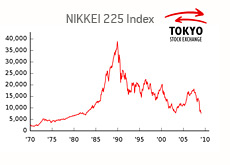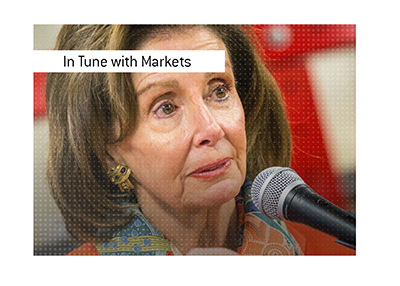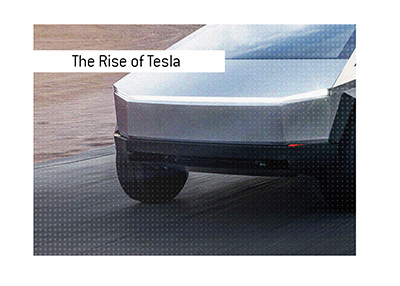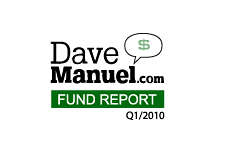Nikkei 225 Hit All-Time High of 38,957.00 on December 29th, 1989
 On December 29th, 1989, the Nikkei 225 hit an all-time high of 38,957.00.
On December 29th, 1989, the Nikkei 225 hit an all-time high of 38,957.00.The Nikkei 225 is a stock market index that contains 225 of Japan's largest publicly traded companies, including the likes of Toyota, Honda, Sony and Toshiba.
The Nikkei 225 is similar to the Dow Jones Industrial Average, in that it contains companies from a wide variety of different industries, including electronics, manufacturing and insurance.
Anyways, from the early 1970s until December of 1989, the Nikkei 225 basically went straight up.
From 1985 to the end of 1989, the chart for the Nikkei 225 really went parabolic, trading from around 10,000 to an unbelievable 38,915.87 in just a few short years.
There was obviously an unbelievable amount of wealth created during the late 1980s in Japan - I mean, imagine if the Dow Jones Industrial Average traded from 10,000 to almost 40,000 in just five years.
All good things must come to an end, and the rapid rise in Japanese stocks came to an abrupt halt in the 1990s.
The 1990s is now referred to as the "Lost Decade" in Japan - speculative excesses were wrung out of both the real estate and stock markets, and economic growth was nowhere to be found. The country took on an enormous amount of debt in an attempt to stimulate their lifeless economy - however, these efforts were largely in vain, as the economy endured a long, L-shaped depression.
Robust growth in the Japanese economy, once referred to as the "Japanese miracle", had now been extinguished.
Japan, FYI, is the second largest economy in the world, with a total GDP of around $4.38 trillion dollars (as of 2007). This is larger than Germany, China, the UK and France.
20 years later, the Nikkei 225 is currently trading at 8,755.26.
This is around 22% of what the index was trading at in the late 1980s.
Why am I telling you this?
I've lost count of the number of people who have told me that they are just going to sit on their long-term investments indefinitely, because the "market always comes back over time".
Sure, the Dow might top 13,000 again in the future.
The S&P 500 might just trade above 1,440 once again.
Heck, maybe the Nasdaq will return to its glory days and trade over 5,000. Anything is possible.
I'm just saying - you NEED to consider the possibility that stocks may take decades to "come back".
There are probably people in Japan that are still holding from 20 years ago, hoping that the Nikkei 225 "comes back".
When you consider that their money has lost value due to inflation, the carnage becomes even worse.
Japan isn't some tiny nation that you should ignore - they have, as mentioned, the second largest economy in the world.
Just some food for thought for you. The markets don't ALWAYS come back. Stocks don't ALWAYS come back. This is what money managers and stock brokers tell you so that you will continue to park your money with them.
These are incredibly uncertain and unique times that we are currently living through right now. Nothing is guaranteed, including any future returns in your portfolio.
Filed under: Stock Market Education



